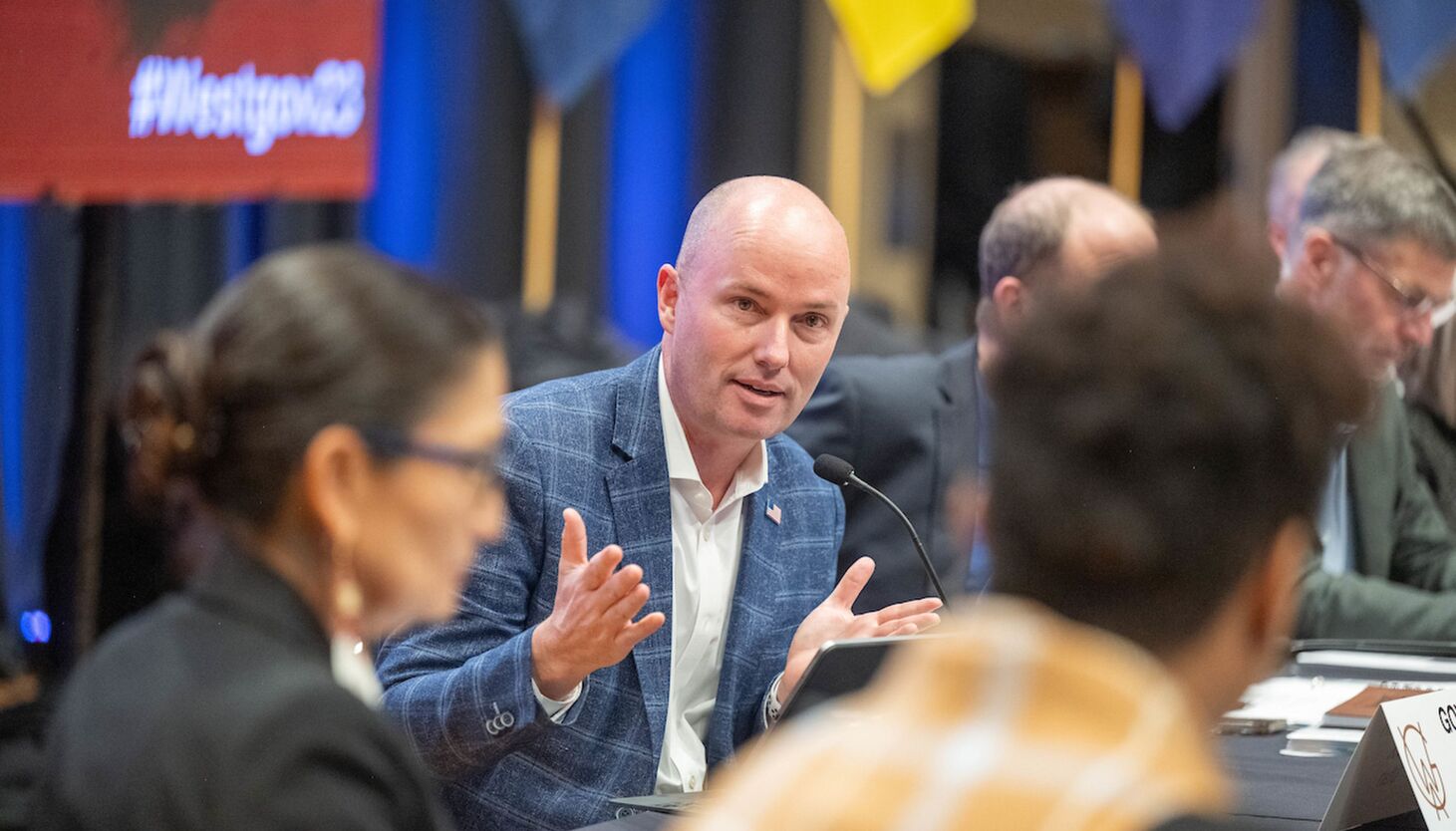Gov. Spencer Cox is convinced Utah, and other Western states, can set an example for the country on how to tackle the mental health crisis.
In a gathering of Western governors Tuesday, Cox displayed his knowledge of mental health research and shared examples of what he saw as Utah putting its money where its mouth is when it comes to expanding options and improving mental health outcomes.
But in an age of increased isolation and alienation, Cox says solutions to the problem lie “further upstream” than health care infrastructure.
“We have too many people going to a psychiatrist who don’t need a psychiatrist,” Cox said. “They need a friend, a mentor.”
Too often, Cox said, conversations addressing mental health treat as a foregone conclusion that the situation is “bad and getting worse” without focusing “even further upstream” to deal with the root causes.
At the root of America’s malaise, according to Cox? A lack of authentic relationships and close personal interactions.
“We’re replacing real connection with fake connection,” Cox said.
The governor referenced visits he made to 29 Utah high schools last spring. During his time in each classroom, Cox would ask students, “How many of you think social media is destroying your mental health?” The invariable result, according to Cox, was that almost every hand would raise.
Utah, Cox said, is one of the states spearheading what has become a national revolt against social media giants like TikTok and Meta for creating addictive and depression-inducing applications with few age restrictions.
But beyond introducing restrictions, Cox said local and state governments should also encourage and incentivize the construction of spaces that revive a sense of community.
Cox applauded the development of multiple communities in the state, including Daybreak, The Point and Utah City, which emphasize walkability, community centers and mixed-use zoning — and, inadvertently, seem to help people feel better.
“They weren’t designed to improve mental health, that was not the purpose of these, but the outcomes of what we’re seeing is they are having a big impact on mental health, just building community the way we used to,” Cox said.
Cox addresses rural health care at Western Governors’ Association conference
Cox’s comments came during the biannual conference of the Western Governors’ Association. The nonprofit organization represents 22 governors in the country’s western half, including 19 states and three territories.
The event, which spanned Monday, Tuesday and Wednesday, was attended by a bipartisan group of four Republican and four Democratic governors, including, besides Cox: Arizona Gov. Katie Hobbs, Idaho Gov. Brad Little, Nevada Gov. Joe Lombardo, New Mexico Gov. Michelle Lujan Grisham, Colorado Gov. Jared Polis, Oregon Gov. Tina Kotek and Wyoming Gov. Mark Gordon, who hosted the event in Jackson Hole.
The governors engaged in nearly a dozen panel discussions with federal officials and business executives. Keynote remarks were given by high ranking members of the Biden administration, including the secretary of the interior, secretary of agriculture and secretary of education.
Topics ranged from how to manage public lands, decarbonizing energy production, optimizing agriculture water use and reforming federal permitting processes.
Cox spoke briefly during each panel and joined Grisham of New Mexico in leading a discussion on improving behavioral health resources in rural areas.
“While we know these challenges affect everyone, they’re especially acute in rural areas,” Cox said. “Just a lack of resources and access to care I think is a certain part of it. And while rural residents experience behavioral health conditions, just like their urban counterparts, they are less likely to be able to have the types of resources that we find in other parts of our states.”
Utah officials have worked hard to identify the gaps in mental health care in rural counties, and over the entire state, and have made real progress in filling them, Cox said.
The national 988 suicide hotline, which made its debut last year, had its start in Utah. The three-digit number provides 24/7 access to certified crisis workers at the University of Utah’s Huntsman Mental Health Institute. Several years ago, Utah lawmakers also invested in the SafeUT app, which also provides access to the university’s licensed counselors at any hour of any day, Cox said.
More recently, Cox added, the state has made “historic” investments in bringing brick-and-mortar mental health crisis centers to Utahns “all across the state.” The centers serve as free, easily accessible locations to bring a loved one experiencing a mental health emergency without having to call the police or face the high costs of the emergency room.
“These resource centers have been just invaluable,” Cox said.
However, there is plenty of room for growth. There are roughly 300 short-term beds dedicated to individuals experiencing mental health crises in a state of 3.3 million, “and that’s a problem,” Cox said.
To bring that number up, there first needs to be the workforce to provide the needed care, he explained, saying the state is looking into licensure reform to get more people into the field quicker, including those with a bachelor’s degree in psychology but no graduate degree.
Do more Utahns suffer from mental illness?
Utah, along with New Mexico, Montana, Colorado and other states in the Mountain West, make up what demographers call the “suicide belt,” Cox said. This area has historically suffered from higher rates of depression and suicide, which research has suggested may be connected to the higher altitude.
For years, Utah’s suicide rate has been higher than that of the country. In 2020, the national rate was 13.48 per 100,000 population while the rate in Utah was 20.57 per 100,000 population, according to the Utah Department of Health and Human Services.
